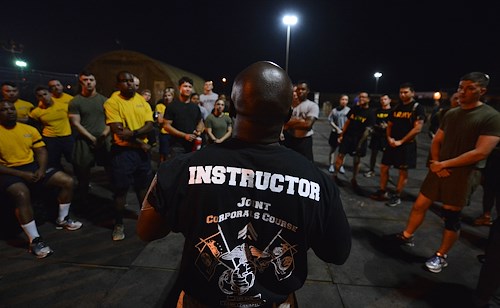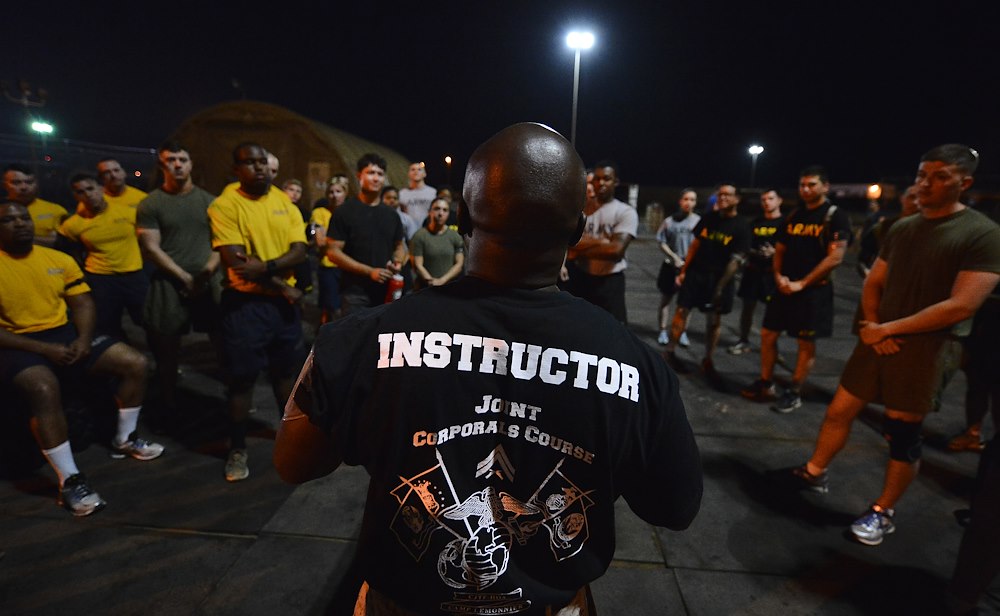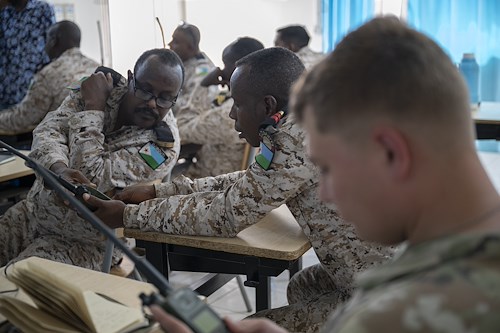Gallery contains 7 images
×
Photo 1 of 7
Combined Joint Task Force - Horn of Africa Image
U.S. Marine Corps Gunnery Sgt. Richard Gyabin, Combined Joint Task Force-Horn of Africa Marine Coordination Element senior enlisted leader, gives a motivational speech, Feb. 26, 2016, before the opening of CJTF-HOA's Joint Corporals Leadership Development Course at Camp Lemonnier, Djibouti. The course, developed by the Marine Corps University, places significant emphasis on developing leadership to prepare junior enlisted members for their transition from subordinates to small unit leaders. (U.S. Air Force photo by Tech. Sgt. Dan DeCook)
Photo by: DeCook, Daniel R. TSgt
Photo 2 of 7
Combined Joint Task Force - Horn of Africa Image
U.S. Army Cpl. Gregory McLellan and U.S. Marine Corps Cpl. Clinton Smith, Joint Corporals Leadership Development Course students, plot grid points during the land navigation portion of Camp Lemonnier's Joint Corporal’s Leadership Development Course at Arta, Djibouti, March 3, 2016. During the evaluation Soldiers, Sailors, Airmen, and Marines had to find eight different points and navigate to those points in a timed event. (U.S. Air Force photo by Tech. Sgt. Dan DeCook)
Photo by: TSgt Dan DeCook
Photo 3 of 7
Combined Joint Task Force - Horn of Africa Image
U.S. Army Spc. Jeileigh Bouchard, Joint Corporals Leadership Development Course student, lifts a weighted ammunition can during a combat fitness test March 8, 2016 at Camp Lemonnier, Djibouti. In addition to time spent in the classroom, students also participated in daily physical training sessions that included the Marine Corps physical training test and combat fitness test. (U.S. Air Force photo by Tech. Sgt. Dan DeCook)
Photo by: TSgt Dan DeCook
Photo 4 of 7
Combined Joint Task Force - Horn of Africa Image
From the left, U.S. Marine Corps Lance Cpl. Kevin Burke, and U.S. Army Spcs. Kimberly Williams and Jasmine Wright, Joint Corporals Leadership Development Course students, plot grid points during the land navigation portion of Camp Lemonnier's Joint Corporal’s Leadership Development Course at Arta, Djibouti, March 3, 2016. During the evaluation Soldiers, Sailors, Airmen, and Marines had to find eight different points and navigate to those points in a timed event. (U.S. Air Force photo by Tech. Sgt. Dan DeCook)
Photo by: TSgt Dan DeCook
Photo 5 of 7
Combined Joint Task Force - Horn of Africa Image
From the left U.S. Marine Corps Cpls. Caitlyn Coscarelli, Sean Decker and Joseph Lewis, Joint Corporals Leadership Development Course students, get last minute studying in before the start of the final course test March 9, 2016, at Camp Lemonnier, Djibouti. The Joint Corporals Leadership Development Course was held over a two-week period and included members from the Air Force, Navy, Army, and Marine Corps. (U.S. Air Force photo by Tech. Sgt. Dan DeCook)
Photo by: DeCook, Daniel R. TSgt
Photo 6 of 7
Combined Joint Task Force - Horn of Africa Image
U.S. Marine Corps Cpl. Caitlyn Coscarelli, Joint Corporals Leadership Development Course student, practices sword drills while watching her fellow students March 1, 2016, at Camp Lemonnier, Djibouti. The course was held over a two-week period, and members of the Air Force, Navy, Army, and Marine Corps attended. (U.S. Air Force photo by Tech. Sgt. Dan DeCook)
Photo by: DeCook, Daniel R. TSgt
Photo 7 of 7
Combined Joint Task Force - Horn of Africa Image
U.S. Marine Corps Gunnery Sgt. Erich Gaskell, U.S. Embassy to Djibouti Marine security guard element detachment commander, congratulates the graduates of Combined Joint Task Force-Horn of Africa's Joint Corporals Leadership Development Course during a ceremony held at Camp Lemonnier, Djibouti, March 11, 2016. Fifteen Army Soldiers, nine Navy Sailors, one Airman and nine Marines complete the two-week leadership course. (U.S. Air Force photo by Tech. Sgt. Dan DeCook)
Photo by: DeCook, Daniel R. TSgt
A graduation ceremony honored 34 members of Camp Lemonnier and Combined Joint Task Force-Horn of Africa as they graduated from a Joint Corporals Leadership Development Course March 11, 2016, at Camp Lemonnier, Djibouti.
The course, developed by the Marine Corps University, places significant emphasis on developing leadership to prepare junior enlisted Marines for their transition from subordinates to small unit leaders.
However, this class was held in a deployed location and composed of members from the U.S. Air Force, Army, Navy and Marine Corps.
Conducting the course in a deployed location and including the other services did not change the course, though. Keeping the same curriculum and Marine Corps standards was important to everyone involved in the course.
“We can’t stop the flow of education for these Marines and other service members. They need us to continue to help develop them,” said U.S. Marine Corps Master Gunnery Sgt. Brent Dorrough, course director. “Holding a joint course isn’t normal, but the only thing that will be any different from every other Corporals Course will be the use of the Joint NCO creed.”
Keeping the course standards the same was also important to the students.
“It was important for me that the standards be the same, because I didn’t want to go through a course that was different from what my brothers and sisters back home in the states are going through,” said U.S. Marine Corps Cpl. Josefina Garcia.
While the course curriculum and standards didn’t change, the way the course was conducted had to be altered. In a normal environment Marines are released from their duty sections and attend classes during the workday. That wasn’t possible for this course, and the students needed to complete the more than 140 hours of training before and after working their normal shifts.
“A normal day for us was physical training at 5:30 a.m., then off to work until 5 p.m., and then class until 11:30 p.m.,” said Marine Corps Cpl. Israel Aragon. “You really had to manage your time wisely, everybody was sleep deprived and we were all tired, but we helped each other push through.”
Due to the demanding daily course schedule and normal work hours, the students participating in the course were all volunteers.
“We know we are asking a lot of these students,” said Dorrough. “Not one of them has to be here, each and every one of these warriors volunteered for this.”
That dedication showed throughout the course as the participants received classroom instruction on war fighting, professional communications, career progression, tactical communication, Marine Corps organization, joint operations, and various lessons built around keeping Marine Corps traditions.
In addition to time spent in the classroom, the students were also physically tested. On the first day the students had to pass the Marine Corps’ physical fitness test in order to continue in the course.
“Walking to the PT pad I didn’t know if I should be worried or not,” said U.S. Air Force Senior Airman Joshua Delmonte, class commander. “It was tougher than what I’m used to, but it made me feel really accomplished once it was over.”
As the course progressed, so did the physical training, and on day 12 the students were forced to dig deep. Before sunrise that morning, the students lined up and began the combat fitness test.
“The combat test wasn’t fun at all while we were doing it,” said U.S. Army Spc. Alivia Nievinski. “The camaraderie we built doing it and [seeing] how we need to be mentally and physically prepared for [combat] made it worth it.”
After the early morning PT sessions, late night studying, hours of classroom instruction, practical evaluations on sword and guidon, and land navigation, one last test stood between the students and graduation – a comprehensive exam covering everything they had learned throughout the course.
“Test day you’re trying to go over everything you learned, but it’s just a ridiculous amount of information, and this is all new. Since I’m Navy this is the first time hearing most of this stuff,” said U.S. Navy Intelligence Specialist 2nd Class Kristen Evers. “Once we got the test back it was a huge relief knowing it’s over and I did it.”
With the course requirements behind them, the students were able to relax momentarily and enjoy a traditional Warrior’s Night.
Warrior's Night derives its history from a number of sources. In centuries past, Viking clans from Scandinavia would gather after a raid or trading mission to celebrate their success and remember those who fell in battle. The members of the course did the same as they celebrated each other’s accomplishment and also paid tribute by toasting the sacrifices of those who came before them.
Following graduation the class commander reflected on his time spent in the course.
“It was great to be able to work with everybody, to see just how far we could go,” Delmonte said. “It was great to have people next to you when you’re giving 100 percent. They could give you that extra one, five or 10 percent you needed.”
In the end the 15 Soldiers, nine Marines, nine Sailors, and one Airman each completed the course with enough points to “walk the stage” and receive graduation certificates from their instructors.


























